‘Right to Repair for Your Body’: The Rise of DIY, Pirated Medicine


That's definitely true, I probably should have been a little more clear in my response, specifying that it can run at startup, but doesn't always do so.
I'll edit my comment so nobody gets the wrong idea. Thanks for pointing that out!
As Cory Doctorow put it, "An app is just a web-page wrapped in enough IP to make it a felony to add an ad-blocker to it."


For those who don't care to read the full article:
This basically just confines any cookies generated on a page, to just that page.
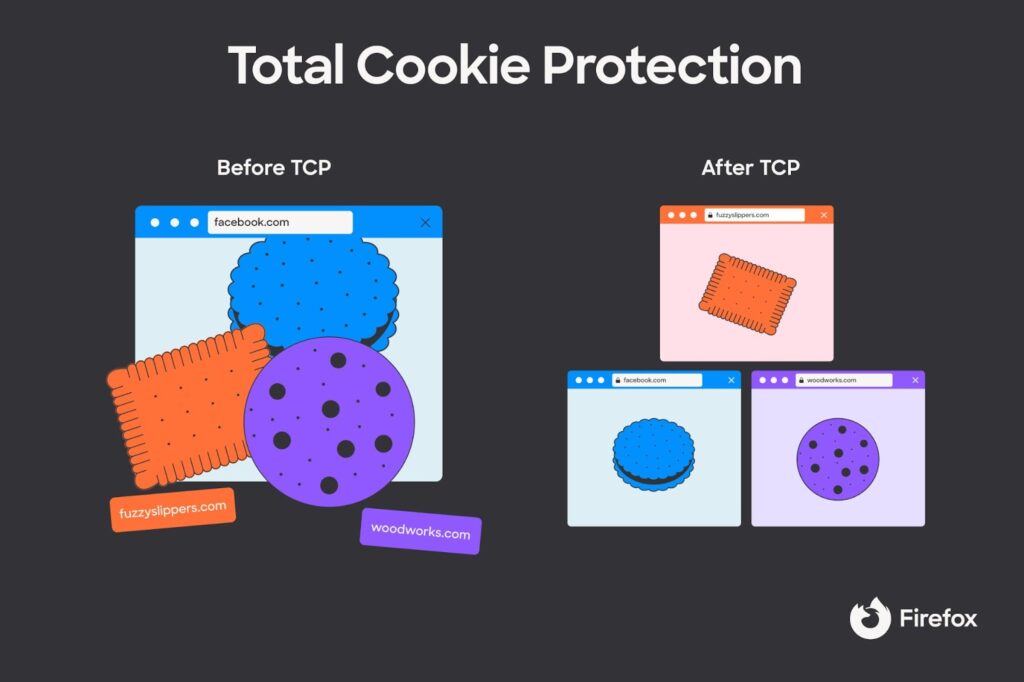
So, instead of a cookie from, say, Facebook, being stored on site A, then requested for tracking purposes on site B, each individual site would be sent its own separate Facebook cookie, that only gets used on that site, preventing it from tracking you anywhere outside of the specific site you got it from in the first place.

Adblockers are the largest consumer boycott in history.
Google isn't just disabling an extension, they're attacking a boycott comprised of 200,000,000+ people, all around the globe, standing up to forced manipulation of our beliefs and habits by profit-hungry corporations.
The "platform economy" is just another term for digital landlords.
Fuck 'em.
Good fucking riddance.
The sooner they realize the enshittification isn't working, and is only increasing the amount of people participating in the largest global consumer boycott ever, the sooner they'll actually try to improve the platform, or die resisting.
YouTube has continuously made the experience worse, adding more and more ads to users not using ad blockers, to compensate for those using them. Guess what, genius? People block ads because they suck. Adding more won't stop people from using ad blockers!
And they have the audacity to try selling YouTube Premium for a whopping $14/mo (nowhere near the actual revenue generated from a user watching ads,) then don't even provide any real benefit past ad blocking, after they deliberately killed YouTube Originals because it didn't instantaneously bring in immense profits.
And the content creators I personally know have shown me the amount of money they get from Premium users, and it's sometimes less than the value of an ad-supported user, even though the Premium user generates more revenue than an ad-supported one.
I would pay for YouTube Premium if it was a reasonable rate, and actually came with exclusive content, similar to Nebula, but it doesn't.
Instead, YouTube has continued to make the interface more and more bloated, slow, and inefficient, and increased the incentives for low-quality, mass-produced content, all while not paying creators enough to support themselves on YouTube's own platform.
YouTube can't see itself as being the cause of its own issues, because it's blinded by bad ad-driven fiscal policy that has only been a proven failure.
I used to like Odysee until I saw them clearly promote conspiracy theories and far-right, almost Nazi rhetoric on the homepage.
Guys, just because the backbone of your site is decentralized doesn't mean your centralized frontend can't be modified by you.
They never even made a single attempt to help others develop alternative frontends too, so the decentralization there was more akin to decentralization theater.
The majority of Americans believe abortion should be legal.
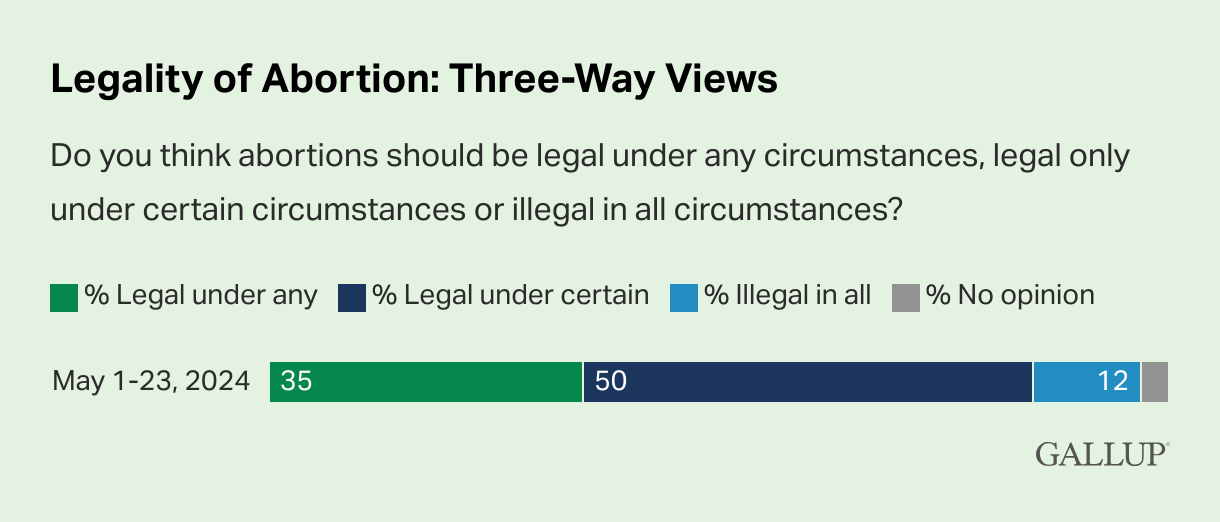
When Republicans say they want to ban abortions, and try to play it off as a popular position, they are lying to your face.
Even a substantial portion of Republican voters want abortion to be legal.
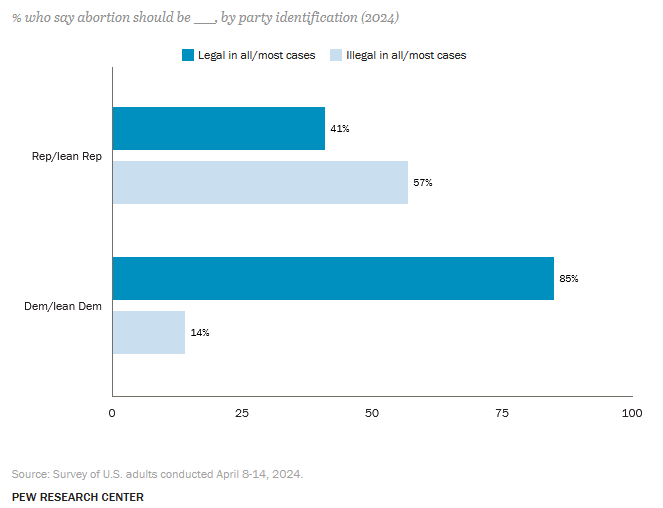
They aren't just fighting most Americans, they're fighting themselves too.
If the Justice Department pushes ahead with a breakup plan, the most likely units for divestment are the Android operating system and Google’s web browser Chrome
Hell yes. If Android is divested from Google, that would significantly reduce Google's attempts to lock down the OS, and would probably make alternative app stores more popular as the Play Store becomes just one of many options for manufacturers that would no longer be required to provide it on all Android devices.
And as for Chrome, about damn time. A browser with that much marketshare shouldn't also be owned by the largest search engine and ad network. That's just a recipe for monopolizing internet standards and access.
Another option would require Google to divest or license its data to rivals, such as Microsoft’s Bing or DuckDuckGo
More competition in the search engine space? Sign me up. Google has too much control over the quality of search results simply due to their size.
If you ever find yourself advocating against voting deciding elections in favor of your own personal opinion trumping all others, you might just be a fascist. Of course, he'd probably take that as a complement.
The people making these ads can't fathom anything past pure efficiency. It's what their entire job revolves around, efficiently using corporate resources to maximize the amount of people using or paying for a product.
Sure, I would like to be more efficient when writing, but that doesn't mean writing the whole letter for me, it means giving me pointers on how to start it, things to emphasize, or how to reword something that doesn't sound quite right, so I don't spend 10 minutes staring at an email wondering if the way I worded it will be taken the wrong way.
AI is a tool, it is not a replacement for humans. Trying to replace true human interaction with an LLM is like trying to replace an experienced person's job with a freshly hired intern with no experience. Sure, they can technically do the job, but they won't do it well. It's only a benefit when the intern works with the existing knowledgeable individuals in the field to do better work.
If we try to use AI to replace the entire process, we just end up with this:
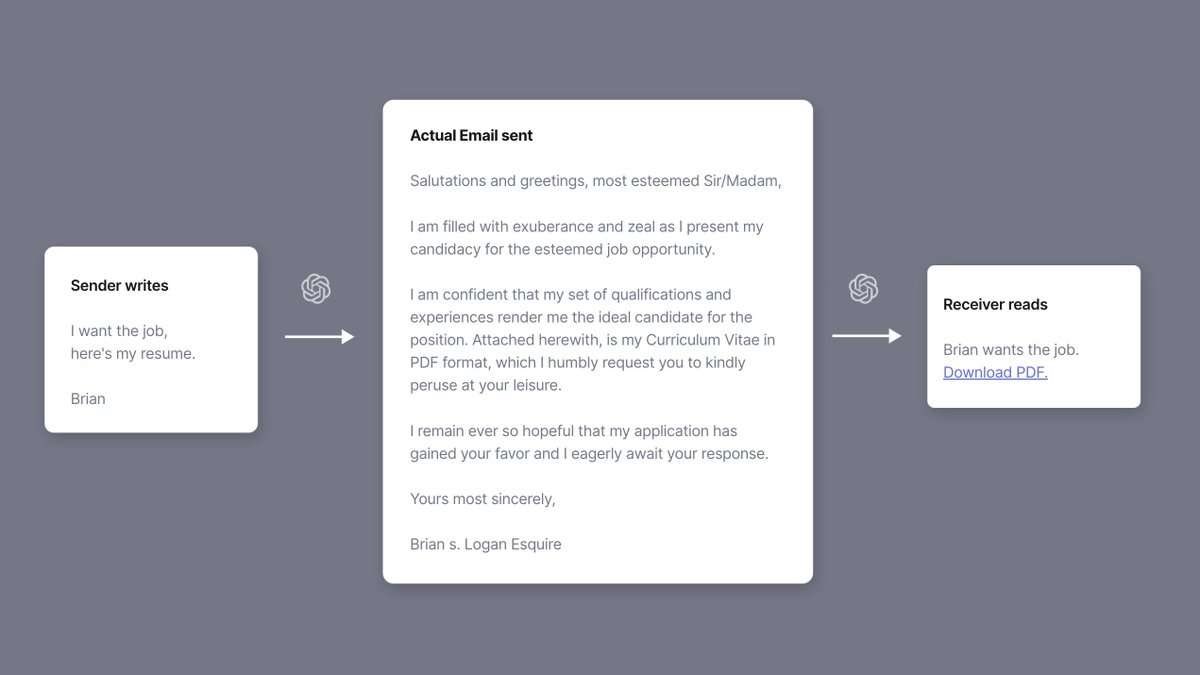
Claiming there'll be a stock crash if someone is elected is not stock manipulation.
If he made materially false statements, about a stock itself, deliberately meant to cause the economy to crash, then it would be a different story, but nothing he said was materially false, as he was just saying an elected candidate would be bad for the economy, in his opinion.
It would be stock manipulation if he acted upon insider information to manipulate the stock price, or used proven, materially false statements about the reality of a company/stock to deliberately drive the stock down in price.
Here's the link for anyone interested. And the campaign's page discussing it in slightly more detail.
The only way she was able to get life-extending treatment was to end her pregnancy, otherwise she would not have been able to prevent the brain cancer from likely killing her, making her not even capable of supporting her existing child.
Better than completely allowing capital to do whatever it wants without even attempting to push back.
TLDR; "weak people have to conform to social consensus otherwise they get hurt I guess?"
I, on the other hand, am a big, strong, high T alpha male, that isn't worried about what anyone thinks! I am a free thinker, and I know my opinions are correct because I instantly based this entire opinion on a subjective, anecdotal view of the world that I then extrapolated meaning out of, the best evidence! /s
About time.
For reference, visa charges about 1.5%-3.5% on everything.
Oh, plus ten cents for every transaction, because fuck you, that's why.
short form content with just a few sentences per post sucks.
I 100% agree with this sentiment.
Jaron Lanier has a great book called You Are Not A Gadget, where he talks about the way we design and interact with systems, and he has some thoughts I think reflect this sentiment very well:
"When [people] design an internet service that is edited by a vast anonymous crowd, they are suggesting that a random crowd of humans is an organism with a legitimate point of view." (This is in reference to Wikis like Wikipedia)
"Different media designs stimulate different potentials in human nature."
He talks about how when a system becomes popular enough, it can "lock in" a design, when others build upon it as standard. Such as how the very concept of a "file" is one we created, and nearly every system now uses it. Non-file based computing is a highly unexplored design space.
And the key part, which I think is relevant to Mastodon, the fediverse, and social media more broadly, is this quote:
"A design that share's Twitter's feature of providing ambient continuous contact between people could perhaps drop Twitter's adoration of fragments."
Fragments, of course, meaning the limited, microblogging style of communication the platform allows for. I've seen some Mastodon instances that help with this, by not imposing character limits anywhere near where most instances would, opting for tens of thousands of characters long. But of course, there is still a limit. Another design feature by Twitter that is now locked in.
But of course, people are used to that style of social media. It's what feels normal, inevitable even. Changing it would mean having to reconceptualize social media as a concept, and might be something people aren't interested in, since they're too used to the original design. We can't exactly tell.
As Lanier puts it,
"We don't really know, because it is an unexplored design space."
Gotta love this quote from the article: "piracy doesn't mean a lost sale if the person pirating the game couldn't afford it in the first place."
I've seen this happen time and time again with people I know who simply couldn't pay even a single dollar for a game, and had no other options available. They deserve to experience culture and entertainment just as much as the rest of us.
I don't think they believe it works.
I think they just believe that shootings are bound to happen, because why else would they be happening on such a regular basis?
It's the constant deflection of responsibility, from our choices as a society, to some indeterminate outside force.
Poverty and increasing cost of living? It's all those darn immigrants.
Your job not paying you enough? Must be overseas industry.
They don't think their prayers will prevent a school shooting, they just don't think there's other options to prevent it that will actually work without "taking away their freedom" (-to own a gun that's more likely to harm them than protect them)
If only they did what DuckDuckGo did and made it so it only popped up in very specific circumstances, primarily only drawing from current summarized information from Wikipedia in addition to its existing context, and allowed the user to turn it off completely in one click of a setting toggle.
I find it useful in DuckDuckGo because it's out of the way, unobtrusive, and only pops up when necessary. I've tried using Google with its search AI enabled, and it was the most unusable search engine I've used in years.
The highest usage of ad blockers happens within the age range of 18-24, which categorically includes Gen Z.
The second highest age range is 25-34, and the third highest is 12-17, which is also included in Gen Z.
That said, I would argue that, while knowing how to use a smartphone doesn't make you tech savvy, knowing how to use an ad blocker doesn't either. It's as easy as installing an extension.
They don't believe it.
They just think their investors will.
Here's a great mini comic that explains that paradox I picked up a while ago:
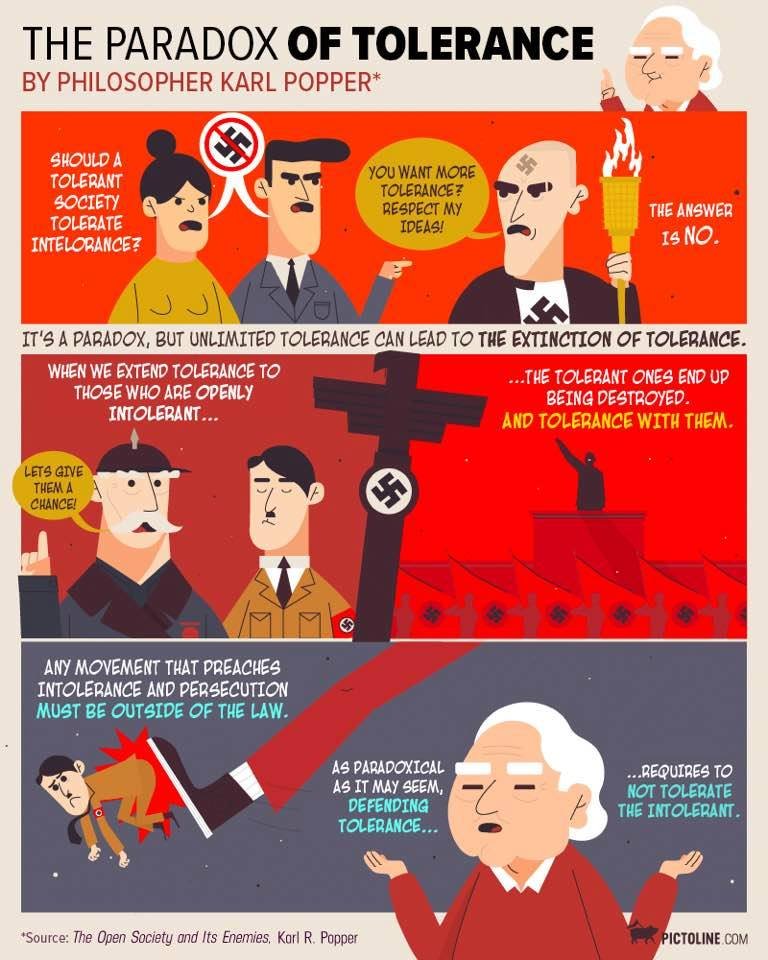
I just wish more software would support webp files. I remember Reddit converting every image to webp to save on space and bandwidth (smart, imo) but not allowing you to directly upload webp files in posts because it wasn't a supported file format.
If webp was just more standardized, I'd love to use it more. It would certainly save me a ton of storage space.
Banning phones in schools needs to be done very cautiously.
In my high school, one of my teachers had one of the best cell phone policies I'd experienced, which was simply, if you had your phone out, she'd just say "hey, what are you doing on your phone right now?" It didn't matter what exactly it was, and there was no judgement passed, but it kept us engaged if we got too distracted, encouraged us to find and share interesting new topics over just doomscrolling, and led to some legitimately informative and valuable conversations.
Other classes would let you use your phone after you got your work done, which acted more as an incentive for completing your work, rather than something you had to sneak in between the teacher talking.
That said, my high school was a competency-based school, which changed the incentives for self-governance of the learning process compared to traditional high school. And of course, it was high school, where most students had better self control.
That might say more about the state of education than the dynamics of phone use in the classroom, but I do feel like schools often try to make students conform to the system as their almost exclusive goal, rather than making the system work for the student, and thus, harsh anti-phone policies aimed at increasing attention in the classroom actually just make students even more angry at the system of schooling, and less likely to enjoy the process of education as a whole.
The best (worst) part is that they almost always just point you to the ways that you can already request your credit report and monitoring for free from the credit bureaus. 🥲
Sources, in case anyone's interested:
Independent photo from different angle pre-speech
Associated Press livestream & coverage
It looks like they were meant to be there as props to demonstrate how the price of food as increased. (the blurry signs above seem to be showing % increases in the price of goods)

Of course, they naturally didn't think through how it would look when zoomed in 😂
Your answer is shaming people who oppose genocide.
Trump opposes genocide? Dang, I guess when he said to "finish the problem" in relation to Israel's invasion of Gaza, released a plan for the Middle East that included giving Israel sovereignty over their illegal West Bank settlements that were the result of their ongoing campaign against the Palestinian people, and told Netanyahu to "Get your victory and get it over with," while also denouncing calls for a ceasefire, then saying "I will give Israel the support that it needs to win but I do want them to win fast," he was just joking around.
"1 in 10 people believe they are not at risk when using illicit sources to watch TV, film or sports."
ONE in ten? Man, they're even bad at cherry picking statistics 😂
They even cite a study with only 1,000 participants for their statistic that "32% OF PEOPLE HAVE BEEN VICTIMS OF FRAUD"
In the title, at least. The body of that claim's card says that it's the people, or someone they know that have been victims of fraud.
Gosh, I hate dishonest scare marketing campaigns.
This simply isn't really possible.
Even if they published open-source code for their backend, it wouldn't prove that it's actually what their systems are running.
And when you are storing your data on their servers, and decrypting it by sending over your password, there's no way you can actually truly prevent them from accessing your data, if they were to modify how their systems function overall. (this is true for every company)
Even if they were using zero-knowledge proofs to verify and prove to you the computation done on the server matched what would be expected from published open-source code, then either their very own systems (and by extension, their administrators), or a different company's proprietary TPM module, would be the root of trust for those ZK proofs, and would still have the same underlying trust assumptions of at least 1 company having the ability to potentially steal your information.
If you want to rail against Proton for this, you have to be against every single cloud-based instance of code that hosts encrypted data, by any company, for any user.
Saying Proton acts just like Microsoft is a laughable comparison to make in order to justify claiming a lack of privacy or security on Proton's part.
Why? Is it because they're both companies that offer online services? Guess what, loads of companies do that. But you know what Proton doesn't do? Give away the contents of people's files, like Microsoft states they do in their own transparency reports, that they conveniently stopped publishing in 2022. Microsoft handed over the content (not just IP, email, etc, but actual docs, communications, stored files, etc) of thousands of people's accounts to law enforcement. Proton hasn't given out content once.
And this doesn't even consider the fact that Proton's business model is privacy. For Microsoft, their users will keep using their services regardless of their privacy, but for Proton, if it comes out that their services are no longer private, nobody will use them anymore, because nobody who got them for privacy would need them at that point.
It applies only to individuals with at least $100 million in wealth who do not pay at least a 25% tax rate on their income (inclusive of unrealized capital gains). Payments can be spread out over subsequent years.
Within that $100 million club, you'd only pay taxes on unrealized capital gains if at least 80% of your wealth is in tradeable assets (i.e., not shares of private startups or real estate). One caveat for this illiquid group is that there would be a deferred tax of up to 10% on unrealized capital gains upon exit.
Without any changes, this would push investors towards the non-included class of real estate, which would exacerbate the housing crisis.
And on top of that, I can think of a million ways they could skirt this regulation with some clever accounting.
Create private startup as a personal asset holding fund > Transfer shares of publicly-traded liquid investments to private startup > Give yourself illiquid shares of the startup that have a time-bound restriction before they are allowed to become liquid (but don't have to become liquid, and can stay illiquid for any longer period of time chosen)
Result: You, the individual, don't hold all the liquid investments. You hold an illiquid asset that's backed by all of the liquid investments. Illiquid assets are not fully taxed under this proposal.
They need to fix this sort of loophole, otherwise it would just be an invitation for the ultra-wealthy to posture about how they're "already being subjected to so many harsh tax laws," while not actually paying the relevant taxes.
I was happy when they used an entirely on-device AI to generate alt text for photos, but this is just ridiculous. They quite literally already have an extension that does the exact same thing this new "feature" offers.
Firefox was supposed to be a less bloated than chrome, but all they've done now is continued to add more and more to the browser that nobody actually asked for.
Give me bug fixes, UX and performance improvements, not entire sidebar popups for review checking that only works on 3 stores on the entire internet.
Always demand a human support representative until it gives you the option to, then the actual human will usually manually process your refund if you complain about how the initial refund never happened.
Bonus chance of success if you're a Prime member and say you're thinking about cancelling.
Owning a house involves paying out of pocket for maintenance whereas when renting, you can have the landlord take care of that for you
Your rent is quite literally paying for the maintenance. You think landlords are just losing money on maintenance out of the good of their own hearts? Of course not, it's just all bundled up and averaged out into one price with your rent.
owning a house would basically anchor me to one location, which gives me less flexibility as a digital nomad.
Cool, that's one of many benefits of housing cooperatives. They can act similarly to a landlord in terms of you sharing the cost of repairs with the whole building, which reduces risk, and they don't have a profit motive, since they're non-profits, so rent is lower than with a landlord. Some even let your rent buy you equity in your unit, which you can then sell later to get some of your money back if you decide to move, much better than the for-profit landlord that will give you nothing. The only issue is, these cooperatives are repeatedly outbid by corporate landlords, which means there's far fewer of them than would be ideal.
Additionally, I've seen some startups like Cohere that seem like they'll eventually be able to give you even more flexibility, allowing you to move between units in various locations without having to sell the old one or file annoying paperwork to start a new lease, with at least somewhat cooperative ownership. (although, of course, this is a for profit company, which isn't as ideal)
I can definitely understand wanting flexibility, but there are ways to get that which don't involve overpaying to a for-profit landlord. I can understand not caring much about equity, but of course, that's why non-ownership housing cooperatives exist.
But to actually make those things more widely available, you need to reduce the market power held by for-profit landlords. If they did not exist, these alternatives, primarily the cooperatives, could fill back in the gaps, but provide lower prices, better service, actual equity for those who want it, and still keep the flexibility you get from renting.
Sorry if my wording was unclear, let me rephrase.
Odysee is the platform, the site, the frontend, and the company. LBRY was the backend, the blockchain-based system that actually stored the videos themselves.
Odysee was the main interface to interact with the videos stored on LBRY, to essentially act like YouTube, but the videos were technically available to anyone.
Odysee then used the justification that the backend was decentralized to say that they had to remain entirely neutral to any content on Odysee, because a decentralized system inherently cannot have its content censored by one party.
This ignored the fact that they could choose to modify which videos their frontend would show to users. They acted as if this was not possible, even though it was.
Thus, a decent YouTube alternative with some good creators on it refused to censor any nazi content that started making its way there because YouTube rightfully deplatformed its supporters, and let it infect the platform without doing anything to stop it, pretending as if they had no choice, while in reality, it just brought them more revenue.
Our voting system fundamentally doesn't allow for third parties to win the vote.
Even if we said "vote for a third party, there's a statistically significant chance they might win!" this wouldn't fix the issue, because Jill Stein doesn't take votes from both sides equally.
Jill Stein leans left, which means people who are otherwise Democrat voters are going to be the largest demographic voting for her.
Our voting system is first past the post, which means this will actually decrease the chance of a left-leaning victory.
Let's say Dems get 55% of the vote without Jill Stein, and Reps get 45%. Democrats win.
Then, we add in Jill Stein. A significant amount of voters switch over, even some Republicans. (which, in reality, would probably not at all, because Jill Stein's policies are even further from their beliefs than even the Democrats are)
Dems get 35% of the vote. Reps get 40% of the vote. Jill Stein gets 25%. Democrats & Jill Stein lose, Republicans win.
If Jill Stein were entirely impartial, and took votes equally from each side, then we could have a vote like...
Dems get 45% of the vote. Reps get 35% of the vote. Jill Stein gets 20% of the vote. Democrats win in the same way they would have whether or not there was a third party.
The issue is that, obviously, Jill Stein isn't taking equal parts of the vote, so this inevitably just reduces votes for Democrats, without reducing votes for Republicans.
It's not an ideal system, (which is why we should advocate for Instant-Runoff or Rated voting) but it's the option that will lead to the most left-leaning outcome, as opposed to a heavily fascist one.
It's not even entirely a matter of if what he said can be disproven in this case, because he didn't even reference a specific stock.
Speculating that the general market will go down, even if you use lies to say so, doesn't count as stock manipulation.
And even if he had singled out a specific stock, speculating on what would happen if an administration with opposing political views comes into office is not the same as saying, for instance, "the CEO of this company actually just stole 20 million bucks and it's gonna tank valuations" while shorting the stock.
It actually already did break sponsorblock for a bit because user submissions would include the wrong timestamps, due to the ads changing the duration of the video.
This would be hard to implement, but I personally would be happy to donate more to fund the development costs for such features. Adblocking is the largest consumer boycott in history and I won't let a corporation try to crush it again.
And the main factor driving down payments is housing prices, which are driven by landlords. Less landlords > less scarcity > lower prices > lower down payments.
On top of that, housing cooperatives exist, which can provide the benefits of renting (lower monthly payments than a mortgage, economy of scale for repairs & construction, less financial liability for the individual) without the negative effects of a for-profit landlord. (you progressively own more of your unit over time instead of never owning any of it, you pay lower monthly rates than you would to a for-profit entity)
They even have different ownership models, which could give more choice for pricing. For instance, the non-ownership model means you pay a lower rate, just the cost of continuing the providing and upkeep of the housing, with no additional profit margin, but you don't end up owning any of the unit you live in. But the ownership model means often paying a bit higher pricing, but in turn, getting to actually own the unit you live in, and later sell it off if you wish to move. (some cooperatives have caps on how much higher you can sell it for compared to your purchase price, others do not)
But in the end, the one thing that makes housing more expensive, that outbids cooperatives for housing, and that increases the scarcity of the market, is for-profit landlords.
The only way you get any true positive change on down payments, housing prices, or housing availability, is to completely ban all for-profit landlording.
To put it very simply, the 'kernel' has significant control over your OS as it essentially runs above everything else in terms of system privileges.
It can (but not always) run at startup, so this means if you install a game with kernel-level anticheat, the moment your system turns on, the game's publisher can have software running on your system that can restrict the installation of a particular driver, stop certain software from running, or, even insidiously spy on your system's activity if they wished to. (and reverse-engineering the code to figure out if they are spying on you is a felony because of DRM-related laws)
It basically means trusting every single game publisher with kernel-level anticheat in their games to have a full view into your system, and the ability to effectively control it, without any legal recourse or transparency, all to try (and usually fail) to stop cheating in games.